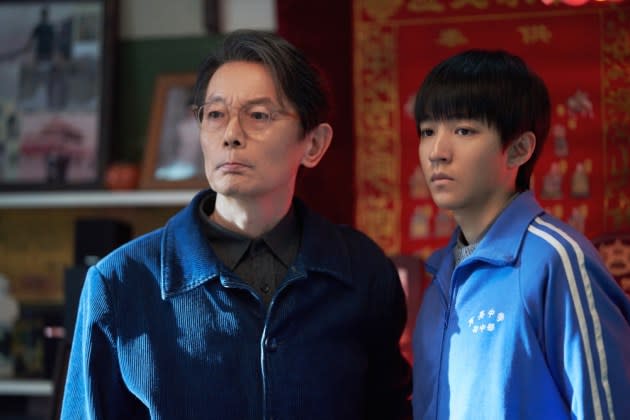Experience Counts for Chinese Auteurs in Shanghai Film Festival Competition

More from Variety
Emerging Chinese Directors Lead Shanghai Festival's Asian New Talents Section
World Premieres, Chinese Titles Dominate Shanghai Film Festival Selection
It has been commonplace in academic circles to divide up and label Chinese filmmakers into generations that reflect socio-political currents as much as cinematic style.
Chen Kaige and Zhang Yimou, who were educated at the end of the Cultural Revolution, are considered the leading lights of the “fifth generation.” The rebellious cluster that followed them, Zhang Yuan, Wang Xioashuai, Jia Zhangke and Lou Ye are among those labelled as “sixth generation.”
But with substantial bodies of work under their belts and international reputations already established, the sixth generation are no longer quite so new, nor so angry.
The four Chinese films selected for the main competition – all world premieres – at this year’s Shanghai International Film Festival represent a showcase of directors who are also known-quantities, but who are worthy of higher profiles. (The festival’s Asian Talent selection has a further selection of six more directors seeking to break through.)
The competition quartet fall into two pairs (a seventh and eighth generation maybe): the latest works of Guan Hu and the rarely seen Gu Changwei on one hand; and a younger generation of auteurs, Wei Shujun and Zhang Dalei.
Guan is in need of rehabilitation after his 2019 war film was selected as the Shanghai festival’s opening film but experienced a last-minute cancellation due to the intervention of unforeseen layers of censorship. The film lost its local release, causing financial misery for its backers. It was released a year later, but with clumsy and obvious cuts.
Guan’s shaggy dog tale “Black Dog” won the top prize last month of Un Certain Regard last month in Cannes. And Xin, the film’s canine star, claimed the runner-up prize in the unofficial Palm Dog competition for good measure.
Returning to Shanghai five years after the “Eight Hundred” meltdown, Guan is serving up “A Man and A Woman,” a pandemic era drama set at a time when lockdowns meant that a man and a woman were segregated into two adjacent hotel rooms. They kill time together, but apart, through the separating wall.
In terms of age Gu is closer to the fifth or sixth generations than the other competitors. But he is better known as a cinematographer – he lensed Chen’s “Farewell My Concubine” and “In the Heat of the Sun” and has had a long collaboration with Zhang Yimou – but rarely takes the director’s chair.
His feature directing debut “Peacock” won the Silver Bear Grand Jury Prize at the Berlinale back in 2005. His second feature “And the Spring Comes”, starring Jiang Wenli earned high praise in China, but had little overseas career.
His new film, “The Hedgehog,” has some attributes that could change that, notably a high profile cast. It is headed by Ge You, who is beloved in China and was the first Chinese actor to win the best actor prize in Cannes (for Zhang Yimou’s “To Live”), and Wang Junkai, better-known as Karry Wang, the leader of TFBoys, one of the most popular Chinese idol groups.
The younger pair, Wei Shujun and Zhang Dalei, are very prolific and frequent guests at major international film festivals.
Wei had had four entries at Cannes since 2018, with all his previous features selected for Cannes. His short “On the Border” won the Special Jury Distinction. His debut feature “Striding into the Wind” was selected for Cannes’ 2020 special edition, while “Ripples of Life” was selected for 2021 Directors’ Fortnight, and “Only the River Flows” was selected for Un Certain Regard last year.
“Don’t Worry, Be Happy,” Wei’s fourth feature and first Shanghai main competition entrant, is a heart-warming family drama starring audience favorite Huang Xiaoming and Zu Feng (“Above the Dust”, “Brief History of a Family” and “Summer of Changsha”).
After an eye-catching debut work “The Summer Is Gone,” which won best picture at the 53rd Golden Horse Awards, Zhang Dalei became one of the most active Chinese faces in Berlin, noted for his short films.
Short, “Day Is Gone” won the Silver Bear in 2021. At the latest Berlinale, Zhang had two competition entries: “Why Try to Change Me Now” in the Berlinale series section and “All Tomorrow’s Parties” in the short film competition.
At Shanghai, Zhang, once again, has two entries. His “Starfall” plays in main competition, while “Dream On” is his contender for the short film prize.
The Golden Goblet prizes, determined by Tran Anh Hung’s jury, will be announced on June 23.
Best of Variety
Sign up for Variety’s Newsletter. For the latest news, follow us on Facebook, Twitter, and Instagram.

